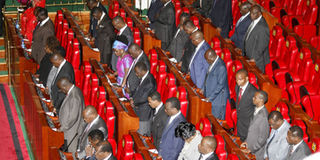MPs’ in-tray full as term nears end

MPs in the newly refurbished Chambers during the official opening at Parliament Buildings August 7, 2012. Parliament will resume on November 20 and passage of the Finance Bill will be crucial in facilitating government spending as the 11th Parliament may only be sworn in after April next year, about two months to the end of the financial year. Photo|FILE|
What you need to know:
- The lawmakers will also have to deal with requests by the Truth, Justice and Reconciliation Commission and the Vetting of Judges and Magistrates Board for the extension of their terms.
- Laws governing the financing of campaigns are also crucial ahead of the General Election.
- Parliament started a six-week recess on October 11. It resumes on November 20, giving it 55 days to conclude pending business before its term expires on January 15.
Resolving the gender representation issue, election financing and a Bill on the management of natural resources are top of Parliament’s agenda before the expiry of its term in roughly 14 weeks.
Mr Abdikadir Mohammed, the chairman of the Constitutional Implementation Oversight Committee, conceded that MPs would have a heavy schedule when Parliament resumes.
The lawmakers will also have to deal with requests by the Truth, Justice and Reconciliation Commission and the Vetting of Judges and Magistrates Board for the extension of their terms.
“We have a lot of critical work pending and very few days left,” said Mr Mohammed on Tuesday.
Parliament started a six-week recess on October 11. It resumes on November 20, giving it 55 days to conclude pending business before its term expires on January 15.
Mr Mohammed said the laws on the management of natural resources are crucial given that Kenya is going into exploitation of oil reserves and other mining activities.
Laws governing the financing of campaigns are also crucial ahead of the General Election. (READ: Alarm as campaign cash Bill stalls)
He addressed the press after a meeting between the committee and a team of Tanzanian MPs at Continental House in Nairobi. The Tanzanians are in Kenya to learn from Kenya’s Constitution-making process.
Kenya’s implementation of the Constitution, now in its second phase, has stumbled on the provision that no more than two-thirds of officials in elected and appointed positions should be of one gender.
Attorney-General Githu Muigai has petitioned the Supreme Court to determine whether that rule can be applied progressively.
Parliament has had to postpone the debate on a constitutional amendment that would resolve the issue.
According to Mr Mohammed, Parliament is stuck on the gender issue because “there are very many men in Parliament who do not support women’s rights.”




